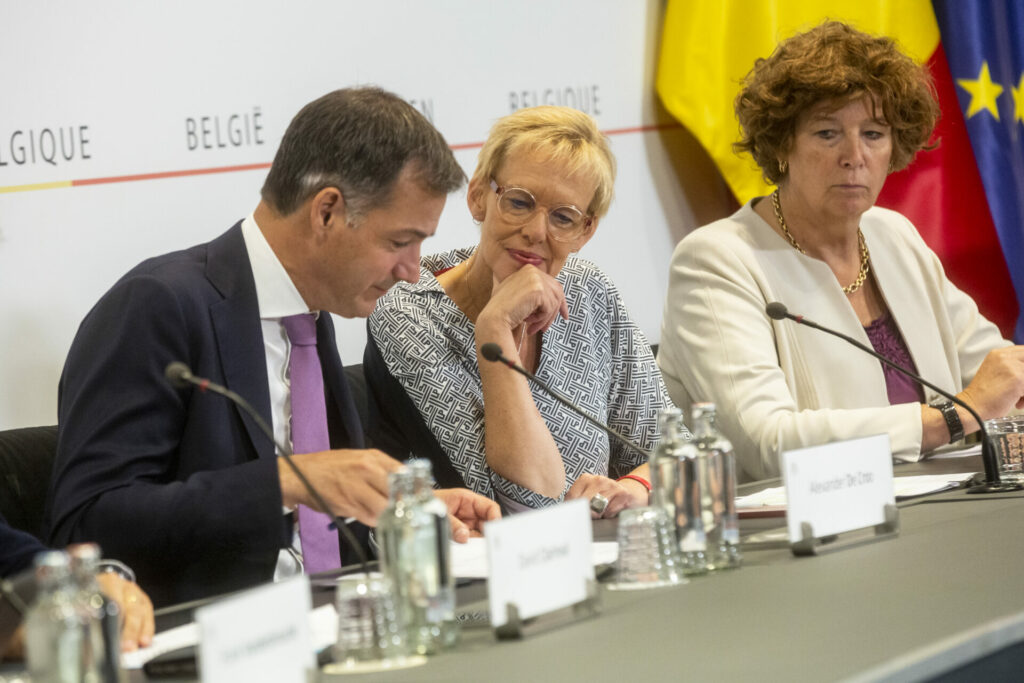Even before Prime Minister Alexander De Croo held a press conference to announce the Federal Government's pension reform, it was criticised by employers, experts and even politicians in the ruling parties. Still, De Croo gives the reform a score of 7/10.
The pension reform – which introduces the condition of effectively working 20 years before someone is entitled to a minimum pension – has been criticised by employers and trade unions alike, as well as by experts who are disappointed and politicians in the majority and in the opposition, who believe it does not go far enough.
"I would give this reform a 7/10. It is a big step forward, but there are still steps to be taken," De Croo said on VTM News on Tuesday. "But that is always the case with pensions: reforms happen step by step, and it is logical that there are also transitional measures."
He explained that the government cannot tell someone who will retire in three years that their pension will suddenly be a few hundred euros lower. "Nobody would accept that and it would also be a bad reform."
Related News
- 'Carrot and stick': Federal Government reaches deal on pension reform in Belgium
- Belgium in Brief: Counting down the days to retirement
However, someone who is ten years from retirement will still have time to change their behaviour and go to work to make sure they will get the minimum pension, according to De Croo.
"This is an answer to a frustration that has been living in our country for many years," he said. "Namely: 'my neighbour has hardly worked in his whole life, and I have worked all my life, but he still gets as much pension as I do'. The condition of working 20 years effectively finally offers an answer: you only get it if you have worked enough to be entitled to it."
'Working people deserve better'
The Flemish socialist Vooruit party is only half-satisfied with the reform. "Working should pay off more. Also in our pensions. That is why we fought hard with Vooruit and Frank (Vandenbroucke, Minister of Social Affairs and Public Health) to increase the pensions and we succeeded," party leader Conner Rousseau told VRT.
"But this is not a major reform. My generation is worried about their pensions later. To secure that, we really need to dare to reform, both fiscally and on pensions," he said. "And that is not the case. I am disillusioned. Working people deserve better."
Sammy Mahdi, leader of the Flemish Christian democrat CD&V party, is not fully convinced either. "No major pension reform, but none of the many absurd proposals that do anything but valorise work either, fortunately."
"When you need days and nights to convince some people that 20 years of work is an absolute minimum, you know enough," he added. "This is a first step, the road is still long."
In the opposition, the Flemish rightwing N-VA party is not happy with the agreement at all, said part leader Bart De Wever. "In a country where all financial parameters are on dark red, De Croo once again goes bows down for the [Francophone socialist] PS."
"Largely not working is almost equal to working all your life for a pension," he added. "Unaffordable and scandalous."
On VTM News, De Croo acknowledged that 20 years is only half a career, but stressed that anything could happen. "There are periods in which people are ill for a long time, they do not choose to do that. Or there are periods in which people take care of children and so on."
He stressed that this is the first time that a condition of years effectively worked has been put in place in Belgium. "And the bar is set at 20 years for now. I hear those who say that we could have been more ambitious, and anyone who knows me knows that I am a fan of more ambition, of going further, and of getting more than a 7 out of 10."
"I have also made several proposals in recent weeks to get the most out of this and to take a step forward, but we need a consensus to do that," De Croo said. "And I would rather be able to take an important step forward than not to find an agreement and not move forward at all."

